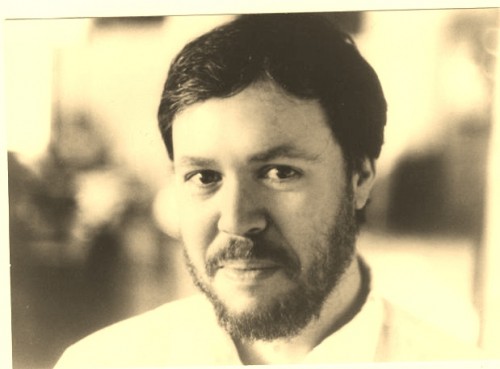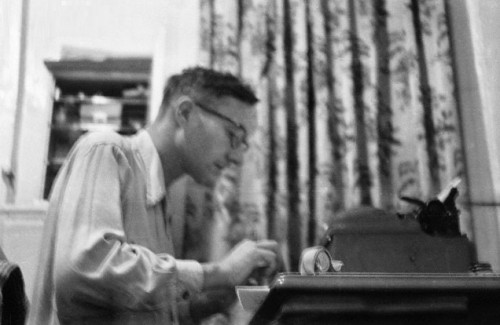Q & A WITH TODD GRIMSON
Todd Grimson is one of the great living cult novelists. I’ve known him for a few years, under strange circumstances. He wrote Brand New Cherry Flavor, which is both one of my favorite horror novels and my favorite novel about Hollywood and the film industry. He also wrote the underground vampire classic Stainless. Both were recently re-released by Schaffner Press, which is now publishing his new collection of stories, Stabs at Happiness, in pleasing hardcover.
It’s a terrific collection, diverse and weird and disturbing. (Here are some reviews: Litbitch. The Oregonian. Gothic.net.) You can and should buy it.
I asked Todd some questions about Stabs at Happiness and about his strange life and career.
For a while, you assumed the name “I. Fontana” and published stories in BOMB, Juked, The Quarterly, Lamination Colony, Word Riot, PANK, the Voice Literary Supplement, Bikini Girl, Spork and many others. We corresponded for some time before I knew your real name. Why did you adopt that name?
Fontana comes from “Fontana Mix,” a composition by John Cage I heard when I was 13. I’m a real fan of some of Cage’s music for piano and prepared piano. “Fontana Mix” was for 24 radios all played on different stations at once. The I. at first stood for Ignacio, as that was the name I used on Dennis Cooper’s blog. Then there was an Ignacio in an Almodovar film. Innocente was born. I wanted to get away from Todd Grimson and the low-level cult-author association the name had with vampires and horror because of my novel “Stainless,” which was actually trying to follow my “cinematic realism” path rather than attempting to be genre. But of course I contradict myself here, because if I made use of the myth I took advantage of the genre. The book sold very well. But there was immediate pressure to write “Stainless II”, and as far as I was concerned there was nothing more to say about this stuff. So I thought I’d start over fresh and see what happened. This made me feel free to experiment again. Also, I was intrigued by all the new online literary mags. However the Grimson and Fontana material is essentially indistinguishable.
You write about sex from different perspectives. Straight, bi, gay, male, female. How much is research and how much is imagination?
I’ve been close friends with several gay men as well as a number of lesbians, just kind of accidentally. I don’t want to make big claims here that I’m an especially good listener or particularly empathetic. A lot of people imagine they can see deeply into other people’s minds and they’re incorrect. Error can be interesting, even so. I claim no special insight into the minds of females, though I have female heroines again and again. It feels natural.
Your fiction is really cinematic. In some cases it takes place in Hollywood or concerns Hollywood legends, like Jean Harlow in “What the Matter Is” in Stabs at Happiness. How does film inform your fiction?
I came up with the term “cinematic realism” in the early 90s, when I was working on Brand New Cherry Flavor. I was trying to connect with a notion I had that our dreams and memories are influenced by Hollywood films, that this is how many of us see things now. I’ve always had a vivid dream-life, vivid enough that I sometimes find myself in places and lives that I’ve never experienced anywhere in my biography. This leads me to tentatively postulate some form of collective unconscious, existing maybe like holographic shards… which we connect with now and then. This is not something I want science to ever understand. But in much of my fiction I’m trying to offer the reader schematics for possible movies to experience inside their heads. Everyone casts these films differently, of course, according to their “budget” and capacity.
What movies are you watching? What directors influence you?
My favorite film of all time is Bertolucci’s “The Conformist.” Then maybe Andrei Tarkovky’s “Solaris,” and, very differently, “Blue Velvet” by David Lynch. I’m interested in everything by Lynch, because he brings in the irrational element that connects with dream-logic and dreams. Ulrich Seidl, Todd Solondz. Sometimes I fixate on a film because of one ritualistic ten minutes I watch over and over. I liked David Cronenberg’s “Naked Lunch.” But then I have a special affection for William Burroughs, even if I don’t really love all of his books. [My own favorite is “The Soft Machine.”] I have a framed photograph of his face on the wall in my bathroom, taken in Mexico City around the time he shot Joan Vollmer. His face is still relatively young. I look into his eyes and think of him in Tangier during the 1950s, writing fiction that he couldn’t rationally, in those days, have ever thought would be published, yet he just kept on typing and tossing the pages onto the floor. That’s it. You just write for yourself.
Where did “Hurt Rescued,” one of my favorite stories in Stabs at Happiness, come from? What a sick, strange, beautiful story.
That and the title story of the collection are the newest pieces. I was thinking of Kafka, and the idea you can draw from him that everything is just different, the world is a little different than you think. Nothing makes sense – or, let’s say nothing makes the kind of sense you’re used to. I think life is quite often like that. This doesn’t necessarily mean that what you discover will be malign.
What about “What the Matter is,” the Jean Harlow story?
That came after reading Michael McClure’s play “The Beard” in Evergreen Review. The only characters in that are Jean Harlow and Billy the Kid. Then I read a biography of her by her ex-agent, and the lost weekend I use for my story really existed. So there was a mystery. And I was thinking about San Francisco in those days, the early 30s, when Dashiell Hammett’s the Continental Op was a detective, he sometimes (“The Dain Curse”) ran into some really gothic milieux. Jean Harlow died just five years after my story, at the age of 26, and there seem to be unanswered questions about her death. Was it untreated PID (Pelvic Inflammatory Disease) – which can develop from untreated GC (gonorrhea)? Jean’s mother was a Christian Scientist, and she famously smashed the IV bottles the MGM doctor had installed in Jean’s room. There’s a lot of food for thought in her tale.
Favorite living writers? Current obsessions/binges?
Nam Le. Deborah Eisenberg. Don DeLillo and Robert Stone have been important to me but are now quite hit and miss. Same with Denis Johnson. I like Mary Gaitskill to a point. A.M. Homes. Bruce Wagner sometimes. Dennis Cooper. Cesare Pavese and Stanislaw Ignacy Witkiewicz are lesser-knowns from the past whose work I admire.
I’ve begun watching DEXTER Season 4. I’ve seen the show in the past. I’ve always found it morally troubling – that Dexter is a “safe” killer, allegedly finding satisfaction in the killing without it ever being sexual satisfaction (does he EVER kill a female?); and no real sadism is ever shown or directly implied. They make it even safer and less evil by the bullshit idea that the person he kills always “deserves” it. So Dexter is actually not evil at all. He’s just killing a bad guy, who really really deserves it. Dexter might just as well be Rambo, or Dirty Harry, or Charles Bronson as the righteous vigilante in DEATH WISH. Dexter’s a cartoon.
The whole serial killer mystique in America mainly got started because of Ted Bundy. He was only really active 1974-78. But he was very successful, killing between 30-35 longhaired 16-25 yr old attractive girls. He got sloppy at the end, when he was sort of losing his mind……because of guilt? Who knows. It pepped him up to be in prison on death row, in a structured environment, a “rock star” among the other cons. Until he went to Ol’ Sparky in 1989.
What’s seems too often left out of documentary treatments of these people is acknowledgment of the intense pleasure that may be found in violence, and in consciously pursuing evil. Successfully accomplished violence makes you high. The Marquis de Sade understood the human animal far better than Jean-Jacques Rousseau.
You didn’t go to college. How has that been a hindrance or a help?
It’s been both. I’m an autodidact, but I was acutely aware early on that the big danger of educating yourself – besides doing it badly – is becoming a crackpot or crank. A jailhouse lawyer, in effect. You might really, really have some lacunae in your thought because you haven’t taken Philosophy 101. So that was a real risk. The positive side of this is the possibility of original thought. You won’t have been subject to the usual group-think. I liked to read, and there was (and is) a lot out there to read. But I had no idea how the real world worked. How one got published. How one got an agent. I approached all that as a total naïf.
You worked in an Intensive Care Unit, then in an Emergency Room for a number of years. How did this educate you – and to what extent were you intentionally seeking some form of knowledge when you applied for these jobs?
I got the job at the VA Hospital after taking a Civil Service Test and getting a high score. But at first I was assigned to the Bonneville Power Administration, as a clerk. I wasn’t crazy about moving to the VA. It was an old, dirty, somewhat spooky place up on a hill. When I ended up in the ICU it took me a while to actually become curious. I had always believed that I was squeamish about blood. Well, I got over it. This time – almost two years – and then the years I worked on nightshift in ER – all of this was my real education. And after a while I was highly conscious of the fact that what I was seeing and experiencing would probably benefit my writing – eventually. Because it can be a mistake to too quickly “understand.”
What are you working on now?
I’ve nearly finished a novel which deals somewhat with the alt-porn underworld, violence and the sort of moral ambiguity I guess reflects my experience in the lurid real world. Hopefully my treatment of such material continues to evolve. I also have an almost-done novel set at the end of the 1960s. I enjoy reading stories with a plot, and I try to write create artifacts I myself would like to read. As Maurice Blanchot said in THE GAZE OR ORPHEUS, the author is the first reader of the mewly discovered text. And as I mentioned earlier, my hero is William Burroughs, typing page after page in his exile’s apartment in Tangier, free from any expectation of those pages ever being read by anyone but himself.
Tags: brand new cherry flavor, Film, innocente fontana, nick antosca, stabs at happiness, todd grimson



Excellent. Thanks for this.
I’d like to hear Todd go a little deeper into how he defines “cinematic realism.” By that I mean I’d like to hear how he actually practices it during the drafting process, or whether he is into lucid dreaming as a method of generating material, etc. I’ve been into this stuff for a long time, would love to hear more.
Going to order the collection.
[…] Click on the following image to read the new interview with Nick Antosca, posted at HTML Giant. […]